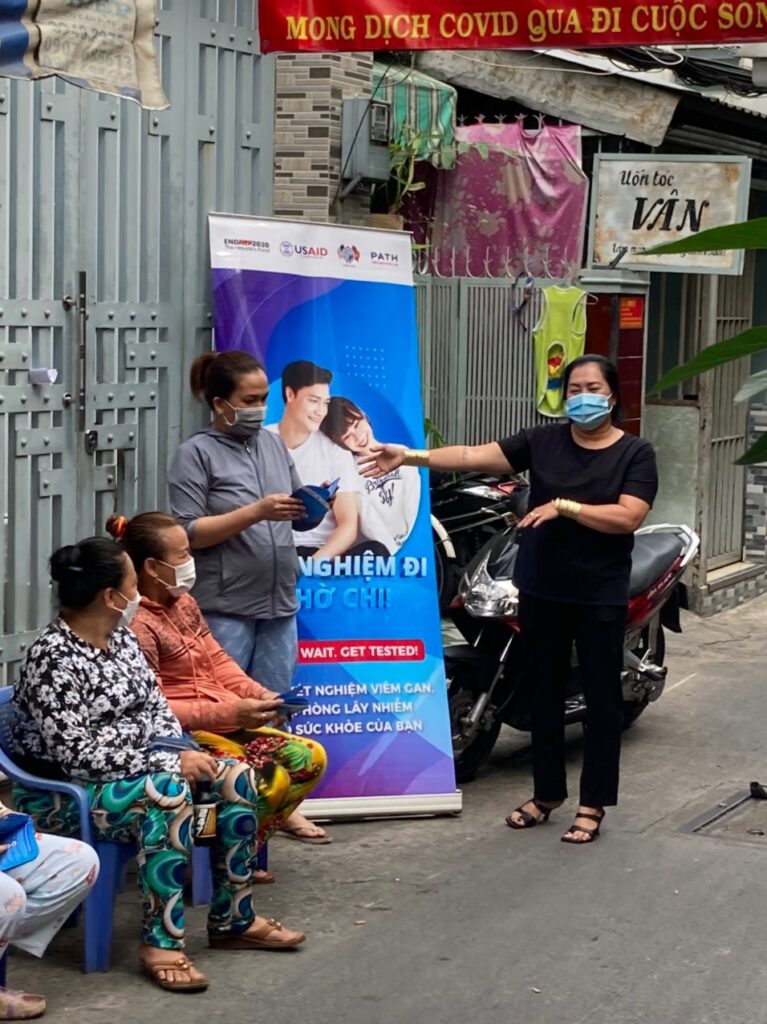About
Project overview
HepLINK Vietnam aimed to demonstrate the cost-effectiveness of a decentralized and integrated viral hepatitis service delivery. The project engaged populations at risk of viral hepatitis in prevention, awareness raising, case detection and treatment, improved viral hepatitis outcomes and provided evidence for scaling and financing interventions that are integral to the elimination of hepatitis C and B by 2030.
Context
Viral hepatitis is the third cause of death in Vietnam. The country accounts for more than one million HCV infections, more than seven million HBV infections, and 22,900 annual deaths (3 deaths per hour) from HBV and 5,900 annual deaths (16 deaths per day) from HCV.
The government of Vietnam developed the first national plan for viral hepatitis prevention and control for the period of 2015- 2019, and in 2016, released guidelines for the prevention, care, and treatment of hepatitis C. These steps demonstrate Vietnam’s commitment to hepatitis elimination by 2030. However, significant improvements in awareness of, demand for, and delivery of chronic HBV and HCV diagnosis and treatment have so far been minimal.
Awareness of the disease and associated risk factors remains low in Vietnam, even among those most at risk: an HCV situational analysis conducted by PATH among men who have sex with men and people who inject drugs in 2018 found that more than 25% did not know that HCV was curable. Just 41% of respondents were aware of direct-acting antiviral agents (DAAs), a treatment option for people with HCV infection.
The most fundamental challenge to scaling anti-HCV screening, diagnosis, and treatment has been the legacy of expensive, toxic and poor efficacy of chronic HCV treatment in Vietnam. With limited treatment options, there has historically been less impetus among the MOH and donors to test and explore ways to increase case detection, treatment, and cure significantly.
Chronic HBV treatment is also relatively neglected, and much more needs to be done to train primary healthcare clinicians in HBV screening, treatment, and long-term management.
Outcomes
The project’s strategic technical approaches included:
- Engaging those most affected by viral hepatitis in raising awareness, generating demand and providing anti-HCV screening services.
- Decentralization of viral hepatitis testing, diagnosis and treatment to the primary care level through the engagement of general practitioners and integration with HIV services in the public and private sectors.
- Ensure a supportive environment for those diagnosed with chronic HCV to successfully complete treatment and remain HCV-free and for those with chronic HBV to successfully stay on treatment.
- Generate and leverage strategic learning from HepLINK to facilitate resource mobilization and implementation of the national program toward ending viral hepatitis by 2030.
HepLINK was implemented in the country’s two biggest cities, Ho Chi Minh City and Hanoi, representing the two regions (Northern and southern regions) of Vietnam and the highest burden of chronic viral hepatitis infection.
RESULTS - HepLINK supported decentralising and integrating viral hepatitis testing at 27 sites across two provinces.
- More than 20,000 vulnerable individuals were screened for HBV and HCV.
- Approximately 900 people received treatment for HCV, and 500 people were enrolled in HBV treatment.
Catalytic impact
PATH provided evidence to the Vietnamese health authorities for scaling up and financing interventions that are integral to elimination. The grantee worked to make diagnosis and treatment more affordable through several key actions, including the promotion of free HCV drugs from the Global Fund, continued advocacy with the Vietnamese administration for medical services and other relevant ministries on the issue to reduce the base co-pay cost, and an assessment of treatment accessibility to inform future action. With evidence generated from HepLINK, PATH is now working with Vietnamese health authorities to further target the key access barriers that hinder diagnosis uptake.
As a direct, catalytic result of HepLINK, the Vietnamese Ministry of Health now allows social insurance reimbursement for outpatient PCR testing. Beyond direct programme outcomes, PATH supported the introduction of HCV self-testing piloting with complementary funding from Unitaid in 2022. This will be an essential continuation of HepLINK’s effort to expand access to HCV testing.
Photo credits: PATH.
